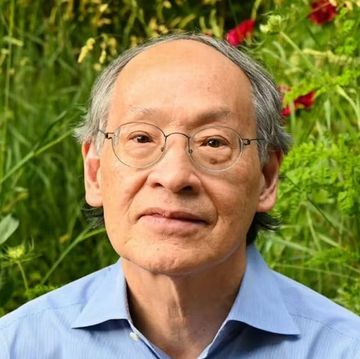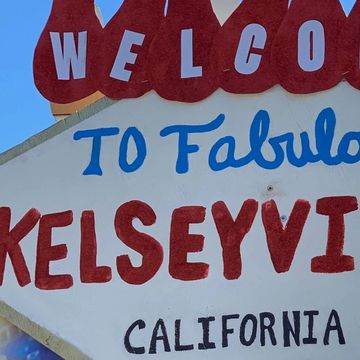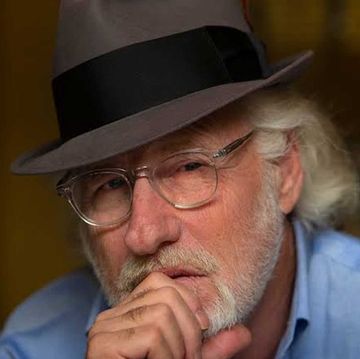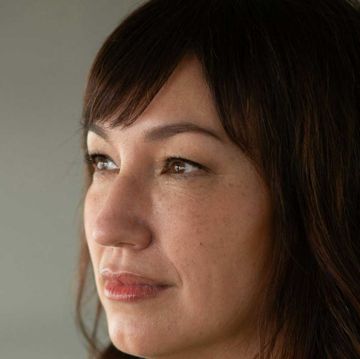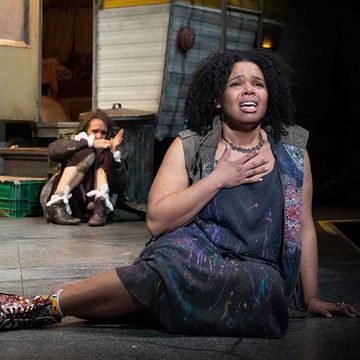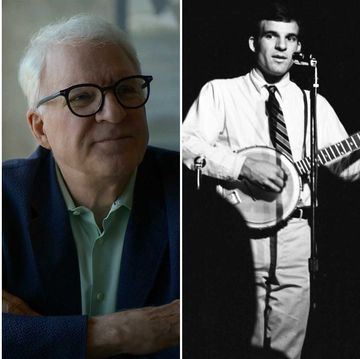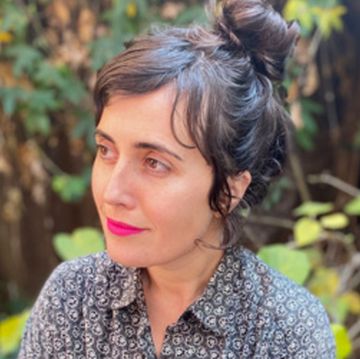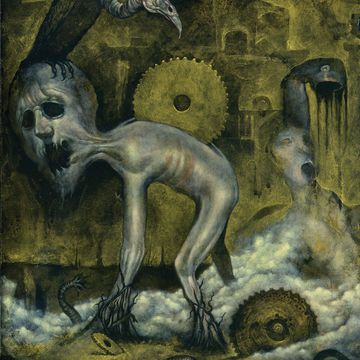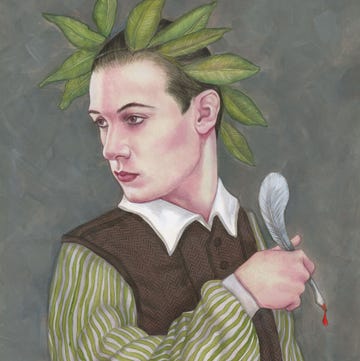Sophie had never been to a drive-in movie before. It was like taking your living room into the world: there was an inside-out confusion about the situation. Different from being in a regular movie theater, where what you went into was the sounds and smells of other people, chewing their Good & Plenty, slurping their Cokes. Palming popcorn into their mouths all through the movie, so that when the lights came back up after, the cement floors were covered with a dirty, buttered snow.
This story appears in Issue 27 of Alta Journal.
SUBSCRIBE
They were in the Chins’ station wagon, all six of them, the Chins plus Sophie. The car, comfortably wide, with streaks of wood paneling on the outside, felt as familiar as a living room to Sophie, so much time had she spent in the way back with Ellen, her best friend, and her younger sister, Amelia, being picked up from school, or on longer excursions into San Francisco when the girls flashed peace signs at people in other cars to see who would peace-sign back, or most often into Palo Alto, for Mrs. Chin’s volunteer shift at the Peace Center there. While Ellen’s mom mimeographed information sheets and protest posters about the Vietnam War, she let Ellen and Amelia and Sophie wander off down the street to get comic books and beef jerky at the local newsagent. Darren, the baby brother, had to stay at the center with Mrs. Chin.
The movie starred Bruce Lee and had the word “Dragon” in the title. That sold Sophie on it. Sophie had learned from Mrs. Chin that with the Chinese system Sophie and Ellen were both born in the year of the dragon. Amelia was year of the snake. Ellen and Amelia were closer than Sophie and her brother, Tom. Ellen was a protective older sibling, not the kind that gave you wrist burns or made fun of your buckteeth. Sophie liked Amelia, too; the girls were a trio together—a few years later when that show came on the air, they would sometimes pretend to be Charlie’s Angels, giving Darren the mostly ceremonial role of Charlie. But obviously, dragons were better than snakes.
It was not a movie meant for kids. Sophie and Ellen were in third grade, Amelia second, Darren—little. But at a drive-in movie, as in your own house, it seemed no one actually checked, and anyway it was Bruce Lee, a guy who did kung fu and was a kind of hero, Sophie understood. From Ellen, Sophie learned after that Bruce Lee was dead, and this gave the movie an added kick. It was his last one. After Dr. Chin treated Sophie to a ticket, he pulled the packed station wagon confidently into a parking place. A speaker was planted by the side window like a metallic sunflower, similar to the ones you spoke into at the hot dog drive-in place that had the giant dachshund on the roof. Luckily it was a warm night, so they could roll the windows down to let the sound in.
The snacks the Chin parents handed around were something called mui. It was salty, and a little sweet, the texture of a dried apricot but a dusky, grayish color in the dim movie light. It was made from plum. Sophie did not love it, but ate it anyway. She found the odd, contradictory taste a good distraction when a naked lady appeared on the huge outdoor screen, walking across a room, something she was not used to seeing at the movies. She closed her eyes, but it was too late. She closed them for some of the fight scenes, too, not so much the kicking but when there was a lot of blood. She was not scared exactly, just aware that these parts of the movie were not for her. She would not tell her mom about any of this.
Ellen and Amelia watched the whole thing, riveted. Darren too, probably, but he was sitting up front with their parents, so it was hard to tell.
Another night, another sleepover. Sophie came from what people sometimes called “a broken family,” which sounded like a motorized toy whose battery had run out, or an armless doll, but in reality meant it was just her mother, her brother, and her at home. This led to the need for sleepovers somewhere else. The Chins had stepped forward with a quiet, steady generosity as Sophie’s alternate family; for Tom, it was the Ravens, who lived farther up in the hills and had a swimming pool and brand-new gadgets like a “calculator” that did math automatically. Both households had three children, and two married parents. It was a solid arrangement. Sophie had no problem seeing the advantages.
By now, a year after meeting Ellen, Sophie knew the Chin home as well as her own, and she enjoyed its other superiorities: a regular upstairs and downstairs, unlike the single-level house where she lived; a pair each of cute mutts and tabbies; and an ample kitchen stocked with white bread and hot dogs, delicacies Sophie’s mother did not allow. (Sometimes Sophie and Ellen traded their packed lunches at school—it was like having a different mom for an hour.) The Chins had two distinct living rooms on opposite sides of the large downstairs, one where they watched TV and Amelia played piano, the other near the grand front door, a room that was up a few broad carpeted steps and had chairs and beanbags around a low, circular table. There, the three girls would lie around on weekend afternoons reading out loud from Ripley’s Believe It or Not!, trying to find the grossest entry. Was it the man with three eyes? Or the guy who could speak through a tube in his stomach? And did they believe any of it, or not? Both Chin girls had a great taste for the weird and macabre, and any sinister detail often led them into fits of giggles. Once they started, it was hard to stop, the way it happens when you’re lying on your back and the world is ridiculous and just when you think you can catch your breath someone says something else and you collapse all over again. Sometimes the girls, and Darren if he was around, created a “scratching machine” together, each person assigned to scratch one of the others’ backs or maybe arms in a beanbagged ring of satisfaction, until someone got bored and they jumped up to play one of their imaginary games outside. Their favorite storylines involved hardship—being orphans, of course, or getting caught in a blizzard, or both—and escape, sometimes from a mean aunt, played unknowingly by Mrs. Chin, or else the Nazis, until the day that Mrs. Chin overheard some of the girls’ dialogue and made them stop that game, because it was anti-German. She said they could keep playing if the evil guards were from some made-up country instead, but where was the fun in that?
Connie Chin was kind, and she was fair, and she was evenhanded. If it was wrong to discriminate on the basis of nationality, then that applied across the board. She had marched to protest the Vietnam War, she had sewn a large square for a Palo Alto history quilt about the Chinese workers who built the railroad, and she never played favorites. She included Sophie, sometimes, in large family gatherings, including once up in San Francisco’s Chinatown, where the food went around the table on a spinning ring in the center, a system Sophie found brilliant. Sophie had met Ellen’s grandparents, her gong gong and her po po. There were times when Sophie realized that the reverse was not true; her mother had not done a fraction as much for Ellen as Mrs. Chin had for her. That, if you thought about it, wasn’t fair at all, but Sophie did not know what she could do about it.
Mrs. Chin had a sense of humor, too, which probably helped explain the Chin girls’ ready giggling. One rainy day, she came to pick up Ellen and Sophie from the park downtown, where they had been at a birthday party and gotten soaked in a sudden downpour. The girls climbed into the way back of the station wagon, always the best place to travel, as you could slide around or stare out the window when the car was at speed, watching the past unspool behind you.
Amelia was in the front passenger seat, next to her mom. She was clean and dry. The younger sister often seemed tidier than the other two, her hair better brushed, her clothes and colors matching. “No offense, you guys,” she piped up, turning her head around from where the grown-ups usually sat, “but you smell like wet dogs.”
Connie Chin laughed. “ ‘No offense,’ ” she repeated. “I like that.”
But Sophie, happy and sheltered now in the car, had not felt any offense. Wet dogs did not smell that bad, in her opinion—it wasn’t like saying your breath smelled like a dog’s, which really would be nasty. Mrs. Chin made Amelia hand oranges back to the girls to eat, which she had to toss underhand so Ellen would catch them, and soon the air around Sophie and Ellen had a fresh spritz of citrus in it, as the rain continued to pound down on the metal roof of the car.
The Chins would likely not have offered to host a sleepover that night if Sophie’s mom had not asked. It was a night Dr. and Mrs. Chin had plans to go to a special dinner in the city, so there would be a babysitter, and it was a Friday, when the Chin children went to Chinese school. Sophie’s mom must have had a strong, specific need for a kidless house, and the Chins, understanding that Sophie had nowhere else to go, agreed that she could come over.
The babysitter part was not a problem. Sophie knew Cheryl, a long, honey-haired 20-year-old who wore flared jeans and looked like she belonged on The Brady Bunch. She had a nice way of saying “Right on!” to most suggestions. So Sophie was not worried about the parents being out, though coming from a household with no room for error, adult-wise, she did feel calmer at the Chins’ when both Chin parents were around. It was part of what gave their household such balance. The house where Sophie lived was dark, a place of trapezoids and triangles—there were no right angles in any of its rooms, by whimsical, Wright-inspired design—and this added to her sense that it could, if the right wolf came along and blew on it, fall over and slide right down the hillside, into the small poison oak–choked valley.
Cheryl came into the back living room, entering through the garage into an unusual level of family bustle. The Chins were dressed up and eager to leave, concerned about the freeway traffic. The broad, heart-shaped beauty of Mrs. Chin was brightened uncommonly with makeup. She was in a sleek emerald dress and black heels, and though the spectacled Dr. Chin wore the characteristic inward look he had passed down to Ellen (it was Amelia who had Connie Chin’s glamour, and would run with it), in his dark suit he looked like one of the smart businessmen in the Bruce Lee movie. Mrs. Chin’s manner was more taut than usual as she gave Cheryl instructions for dinner, then made a gesture to Sophie to come out into the hallway with her, where she wanted to talk to her privately.
Mildly alarmed, Sophie followed her friends’ mom, leaving the others in the living room with Cheryl, who was playing with the dogs while asking the kids questions.
“So, Sophie,” Mrs. Chin said to her in a low voice, as she stood out near the den. “Ellen, Amelia, and Darren have Chinese school tonight.”
Sophie nodded. She already knew this. Ellen had explained to her that all three kids went to Chinese school once a week, to learn Mandarin. Sophie thought that sounded like a lot of work, on top of regular school, but also that it was a little like having a double life. Sophie only had the one, unless you counted her and Tom’s occasional days up in San Francisco, with their dad.
“You are going to have to stay here with Cheryl,” Mrs. Chin continued, “when the kids go to school. All right? Cheryl will take care of you. The Hsias are coming here to pick them up, and you’ll just stay here with Cheryl. Chinese school goes to 7:30, so they’ll be home a little after that, and then you can all have dinner together.”
“OK.”
“Do you understand? You have to stay here with Cheryl.”
“OK.”
“But you’ll all have dinner together.”
“OK.”
Mrs. Chin’s repeated instructions made Sophie start to feel anxious and unconsciously reply with her own repetition. Neither of them was completely settled after this exchange, but Mrs. Chin looked at Sophie, smiled slightly, then turned to rejoin her husband so they could leave for their fancy dinner. Sophie was not sure if she was supposed to follow to say goodbye to them. She stayed where she was, in the hall by the den. Strangely immobilized.
Almost the instant she heard the door close behind Dr. and Mrs. Chin—they, too, went out the back into the garage, where the station wagon waited—Sophie felt the familiar clutch in her stomach. She never normally experienced this at the Chins’ house, not since the first sleepover, when in the dark middle of the night, lying on the padded floor between the two sleeping sisters, Sophie woke with a sharp, sure panic that she needed to get up and go home, no matter the hour. It got so bad that she reached up and touched Ellen’s arm to wake her up and tell her, but Ellen, always calm, never mean, just held her hand out from her twin bed a few inches above her and whispered, “You’ll be OK, Soph.” She sounded so confident and sure, even half asleep, that Sophie believed her. And Ellen, whose family nickname was Len-Len, proved to be right: Sophie went back to sleep and was just fine, and in the morning they had waffles made in the toaster, which were delicious. Another new delicacy.
Ellen came out into the hallway where Sophie still stood, as if waiting for something. Sophie could see that her friend was in big-sister mode. “Come on, Dare,” she called back over her shoulder to her little brother, “let’s get your workbook for school. Is it still upstairs in your room?” The small, bowl cut–haired boy nodded and followed her upstairs to go and find it. He reminded Sophie of the ducklings that waddle along behind the mother duck in the picture book.
Amelia, ever organized, came out into the hallway ready to go, then sat down on the broad den steps and started reading her book (Encyclopedia Brown). She looked up after a minute to ask Sophie, in a tone of mild curiosity, “What are you going to do?”
“I’m—”
But the rest of the sentence got stuck and wouldn’t come out. The anxiety tightened its clench. Sophie found that she did not have a lot of breath. Her back molars, the ones with all the fillings in them, started to grind against each other.
“You’re staying here with me, aren’t you, Soph?” Cheryl said, smiling, hands in her jeans pockets. Her long hair flowed when she walked, as though she were in a shampoo commercial. “We’re going to have fun together.” Sophie did her best to nod her agreement. Amelia went back to her book.
Then, suddenly, there was a busy confluence in the entrance hallway: one of those moments when events fall into place in a precise sequence that later seems inevitable, like the series of wrong turns that leads to the fatal accident, or the day Sophie rashly said “yes” to the haircutter when asked if she wanted bangs and had to live with the result. The doorbell rang, the dogs barked, Cheryl opened the door to Michael Hsia, the one other Chinese kid in Ellen and Sophie’s class, Amelia stood up to go, Ellen and Darren jogged down the stairs together with their workbooks. Ellen dropped easily into a squat to help Darren on with his scuffed loafers, which were waiting for him by the door, then she grabbed his hand to take him out with her to the car. Sophie could see now that whatever Chinese school was, it required nice-looking clothing, which was one more reason—not that another was needed—why it was ridiculous for her to blurt out, as she stood in her Snoopy T-shirt and blue jeans, her voice abruptly returning to her, “Can I come too?”
She addressed her question to Michael Hsia, her classmate, as if it were up to him.
He shrugged.
“Let’s go,” Amelia said, her turquoise canvas bag on her shoulder, like she was already a teenager setting out to go shopping at the mall. She had that self-assurance. She ignored Sophie, and that was an answer in itself.
“You were going to stay here with me, though, remember?” Cheryl put a hand on Sophie’s shoulder, but everything was rushed and it was a weak and indecisive hand, Sophie could feel that, there was no authority in it, and the person who knew the rules best, the one who really ran the show when the parents were out, namely Ellen, avoided Sophie, focusing her attention instead on her little brother, as if it required all her third-grader skills to usher the boy out and down the pebbled sidewalk to the Hsias’ waiting car. Sophie could tell that Ellen wasn’t going to look at her, wasn’t going to weigh in one way or another.
“Please…?” Sophie said plaintively to anyone who might notice her. “I won’t say anything. I promise, I’ll just sit in a corner—” But she had already slipped on her tennis shoes and was following Michael and the others out the door.
“There’s not going to be room,” Amelia said from a few steps ahead, but the Hsias, too, had a giant wagon, and Mr. Hsia, driving, was unfazed by having another passenger. Ellen, without comment, took Darren onto her lap, and they were all able to squeeze in.
Cheryl had followed them out, trailing sentences of protest about Sophie going with the others, saying again that she should stay, that they would have fun there together, but the babysitter’s voice was thin in the outside air, and vanished in the dusk’s murky light like the evening insects, which were out looking for their next meal.
The school itself would fall out of Sophie’s memory. A fluorescent-lit classroom in the darkness, closer to where they lived than she had imagined. (It had been there all along, on a side road on the way into town, and Sophie had never known.) Rows of faces not like hers, but whether there were 10 kids in the room or two dozen, she could not have said.
What remained was the chilling shadow of the wrongs. Of Sophie’s two wrongs.
The first was clear right away. Sophie felt it in Ellen’s younger sister’s obvious disapproval, and the quiet on the car ride down, and in her own strong, immediate sense that she had gotten away with something, as though Sophie had shoplifted an expensive bracelet without meaning to, and now had to figure out how, or whether, to return it. There was a heavy weight in Sophie’s stomach, a mass, like when you ate too much cookie dough at once, a feeling distinct from, though as bad as, the anxiety it had replaced. If being anxious caught at your throat, and made it difficult to breathe, then shame—for this was shame, certainly—affected your stomach. It lived in your digestion.
Later, Sophie would never remember how the teacher or teachers at the school had dealt with her unexpected presence. She knew that she acted as she had said she would, tucked in a corner making no trouble while the real students practiced forming their characters, answered the teacher’s questions, did their exercises. Sophie sat surrounded by well-mannered, hardworking children of different ages who were all wordlessly aware that she did not belong in that room.
It might seem as though it was all one wrong, Sophie’s going to Chinese school that night with the Chin children, her making that intrusive mistake. But there were two. The other one was what Sophie had done, the unkindness she had done, to Mrs. Chin.
Cheryl had not minded, or at least did not say anything about Sophie’s escape when Mr. Hsia dropped the four of them back off again. The babysitter had the pizza ready and the TV tuned to the station that was broadcasting a nature show they all could watch together, about tree frogs, and even Amelia ended up forgetting to glare at Sophie, so they had as much fun as they usually did, forming the nest on the ground between the girls’ two beds where Sophie would sleep, talking to one another in the dark before they each dozed off. It must have been a late night for the parents, as the girls were all sound asleep by the time they got home.
It was in the morning, and it was not where the others could hear her, but in the den the next day Mrs. Chin gave Sophie a sharp and unforgettable scolding, the only one she ever delivered. Mrs. Chin’s always warm and easy face was cold and hard as she told Sophie, clearly, that she had done something wrong. Mrs. Chin was angry. Sophie heard it, but beyond that she felt it, in her bones as it seemed to her. The chill went all the way in.
Sometimes when you’re young you turn against the scolders; some kids make the chiding adults into villains, to ease their minds and their consciences. Other kids are ready to suspect that they really are the vandals or thieves they’re being told they are and that the chastising is deserved. Sophie was one of these. She was generally a good student, smart, did her homework, followed the rules, but the few times she got into trouble—sent once to the principal’s office for a line of back talk, or out to the corridor for whispering in class—Sophie wondered if something hidden and true about her was finally being revealed. There was the shock of having a blemish on her clean record, followed by the buried, nauseating sense that her record was not as clean as she pretended.
“That school was not for you,” Mrs. Chin told Sophie that morning in her cool, dry voice. “I told you that. I told you to stay here with Cheryl. You had a place here, Sophie, you had somewhere to be, and it wasn’t there. I told you that.”
Sophie mumbled and looked down. She said sorry, over and over again. It was hard for her to look up, so she didn’t, and Mrs. Chin, having made her point, eventually stopped the scolding, and Sophie was allowed to return to the kitchen, where the others were having breakfast. Mrs. Chin busied herself with tidying up dishes by the sink.
Sophie wasn’t hungry, of course. That day the toaster waffles had no appeal, and though she had a plate in front of her, she could not eat the food on it. When the others had finished their waffles and mopped up the last of the syrup, Mrs. Chin got a few oranges from the bowl on the counter and placed them on the table. Ellen, as usual, started peeling, the white and orange skins piling up on the wooden table as she dug her way into the fruit. She handed a few segments to Darren first, then to Amelia, and then she held out a few to Sophie. Sophie knew that this meant that she was forgiven, even if it was Ellen and not Mrs. Chin feeding her the orange. She knew, too, that she must eat it, even if she didn’t feel like it, even if she still had a clotted mass of regret in her stomach, because when someone offers you a gift, it is an essential courtesy to receive it.•

Sylvia Brownrigg is the author of seven acclaimed books of fiction: a book of stories and five novels, including The Delivery Room (winner of the Northern California Book Award) and the Pages for You series (winner of a Lambda award), as well as a middle-grade story Kepler’s Dream, published under the name Juliet Bell, which won a Mountain Prize and was turned into an independent feature film. Sylvia’s works have been included in the New York Times’ Notable Lists and Los Angeles Times books of the year, and have been translated into several languages. Her short stories have been read as part of NPR’s Collected Shorts, on BBC Radio 4, and published in journals including the art magazine frieze. Sylvia has also taught creative writing and has been widely published as a reviewer and critic. Her pieces have appeared in the New York Times, SF Chronicle, the Guardian (UK), and the Believer Magazine. Sylvia lives with her children in Berkeley and continues to spend time in London. Her new memoir, The Whole Staggering Mystery: A Story of Fathers Lost and Found, is published in 2024 by Counterpoint Press.






